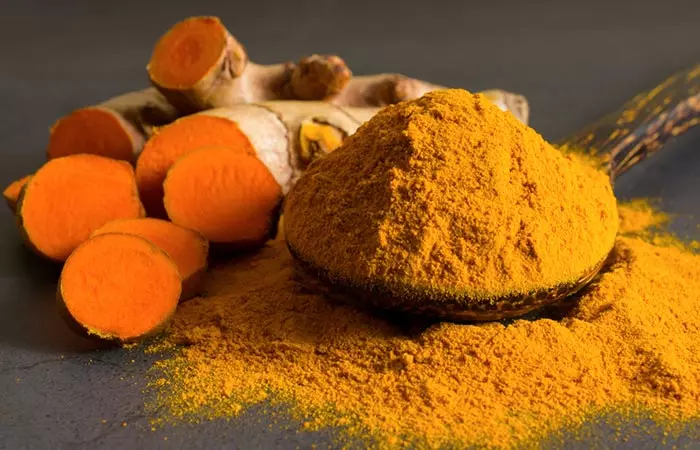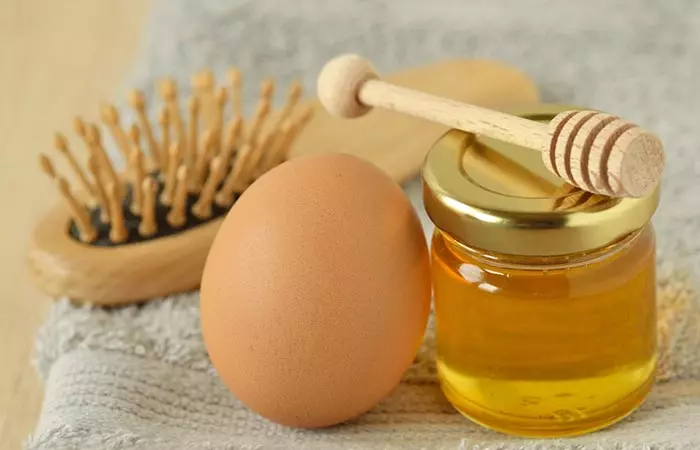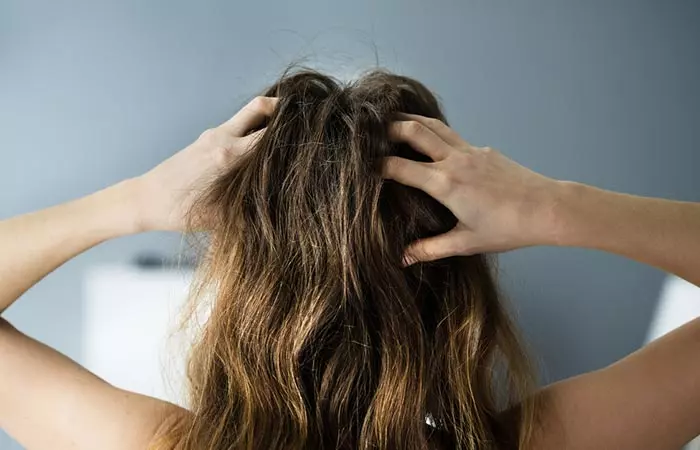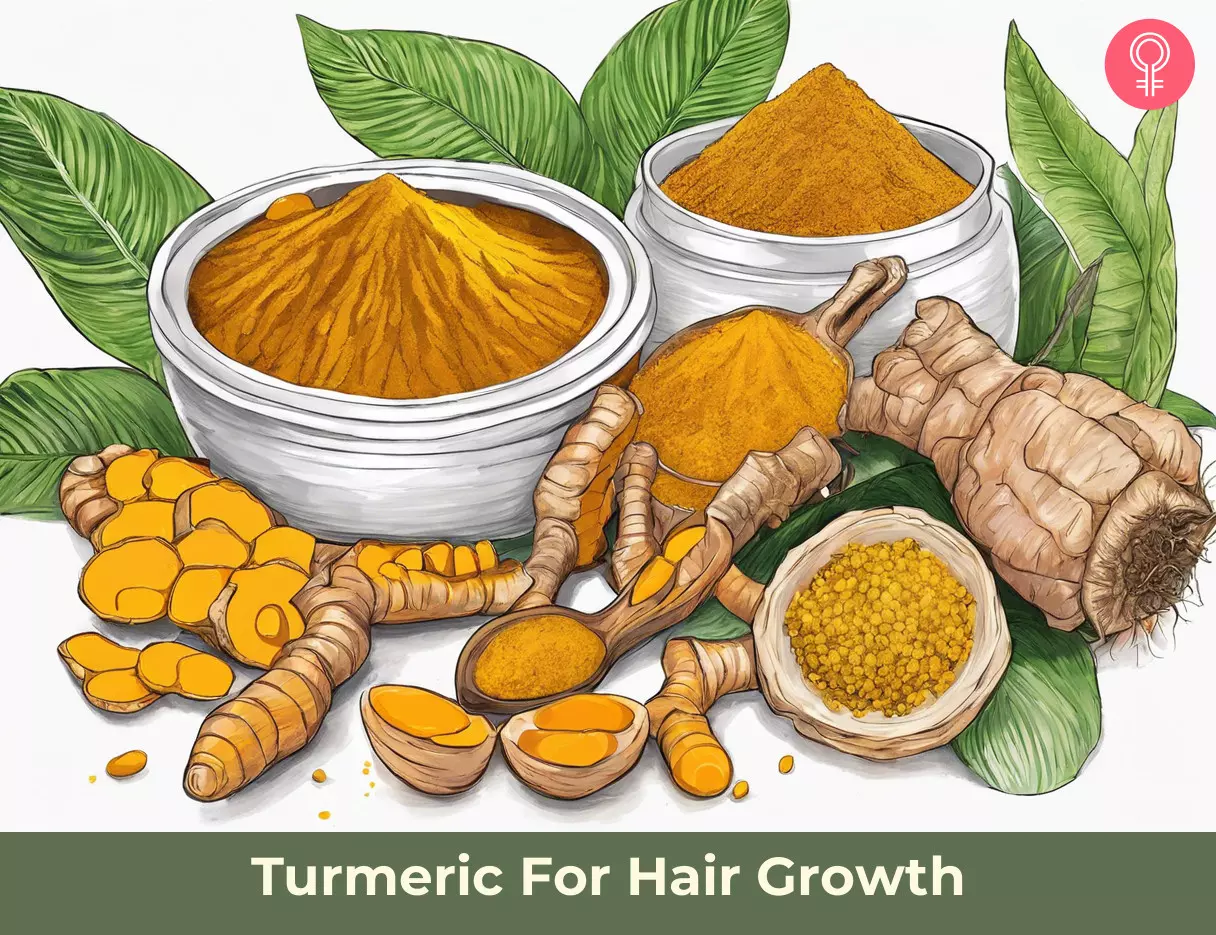Is Turmeric Good For Hair?
The list of Turmeric benefits is long, including many health advantages. However, the common Turmeric benefits include improving hair and scalp health and reducing hair loss. It is often used in hair masks to treat scalp issues, such as dandruff, psoriasisi, and even mild acne. This herbal treatment is an excellent home remedy that can help with scalp nourishment. But when it comes to hair growth, little is known about its effectiveness. Who Can Use It? Can be consumed by everyone, except those with gallbladder problems, GERD, bleeding disorders, and infertility. How Often? Can be consumed daily in moderate amounts of 500 to 2000 mg. Caution Can stain the skin and trigger allergic reactions. Pregnant and nursing women and those on blood-thinning medication should avoid it. What does science say? Read on to know.
Benefits Of Turmeric For Hair
Helps Treat Dandruff: Research shows that turmeric, when paired with coconut oil, can be used as an antifungal treatment for dandruff. The mixture could prevent hair loss, scales on the scalp, and itching caused by Pityrosporum ovale, a fungus known to cause dandruff. However, in the study, this mixture was found to be less effective than a 2% ketaconazole shampoo (1).
Improves Blood Flow: One major cause of hair loss could be low blood circulation (2). The curcumin in turmeric also helps in the development of blood vessels (3). Turmeric may improve blood circulation and stimulate hair growth (4). Fights Inflammation: Turmeric contains curcumin that offers anti-inflammatory support. It may help heal wounds on the scalp and soothe redness or inflammation. The spice also has antimicrobial and anti-androgenic properties (5). Curcumin also provides antioxidant support against the damage caused by free radicals. It can also prevent follicular regression (5). Preserves Hair Color: In a study, a dietary supplement of curcumin was found to help keep hair from turning gray (6). It can be used as a vegetable hair dye as well (7). Treats Scalp Issues: Curcumin can also help treat skin disorders that can affect the scalp, including acne vulgaris, dermatitisi A common skin inflammation and irritation caused by allergy, pollutants, genetics, or skin damage. , alopecia, and scalp psoriasis (8), (9), (10). Due to this, its use is an oft-quoted beauty tip to prevent skin irritation and improve skin and hair health.
As per this study, around 2% of the general population face a lifetime risk of developing alopecia areata (AA). The prevalence of AA varies between 0.1% and 0.2% based on geographic location and ethnicity. Adult patients with a family history of AA have an estimated prevalence ranging from 0% to 8.6%. Early onset AA, occurring between the ages of 5 and 10, often presents as a more severe form of the condition.
Improves Hair Growth: Research shows that curcumin induced hair growth in a murine hair cycle (11).
Turmeric has several benefits for hair health. In the following section, we will explore the various ways you can use turmeric to achieve the same.
How To Use Turmeric For Hair Growth?
1. Egg, Honey, and Turmeric Mask
You Will Need
Eggs, 2 Honey, 2 tablespoons Turmeric, 2 tablespoons
Prep Time 5 minutes Processing Time 30 minutes Procedure How Often Once a week Why It Works Eggs are rich in protein (12). Research also shows that the egg yolk may stimulate hair growth (13). Honey is a good emollienti A substance or ingredient that helps moisturize the skin by forming a protective layer on the skin. and protects the hair from dandruff and the associated hair loss (14).
2. Milk, Honey, and Turmeric Mask
You Will Need
Milk, 1 cup Honey, 2 to 3 tablespoons Turmeric, 3 to 4 tablespoons
Prep Time 2 minutes Processing Time 30 minutes Procedure How Often Once a week Why It Works Milk is rich in protein. It can help treat hair damage, hair loss, and baldness (15). Honey can be used to treat hair loss, hair damage, baldness, and alopecia. It also preserves hair endings, treats scalp acne, and prevents head lice and dandruff (15). Melissa Denise, a beauty and lifestyle vlogger, used a similar turmeric mask and felt it was not worth the hassle. She had to wash her hair three times to get it all out. She says, “The positive thing about it is first when I started rinsing my hair out, it was very manageable and I didn’t detangle my hair at all but I could just run my fingers so and I felt like I had conditioner in my hair so I will say that but other than that I believe it like I wouldn’t be doing it (i).” Wash the mask off with warm water and a mild no-sulfate shampoo for best results.
3. Coconut Oil And Turmeric Mask
You Will Need
Coconut oil, 4 to 5 tablespoons Turmeric, 2 tablespoons
Prep Time 2 minutes Processing Time 45 minutes Procedure How Often Once every week Why It Works Coconut oil is known to stimulate hair growth (16). It penetrates the hair shaft and prevents protein loss from hair (17). This also may help improve blood flow and hair density and thickness. It prevents protein loss even in damaged hair. It is a well-known hair moisturizer too. It can also be used to combat dandruff when paired with turmeric (2).
4. Lemon Juice And Turmeric Mask
You Will Need
Turmeric powder, 2 tablespoons Juice of 1 lemon
Prep Time 5 minutes Processing Time 30-40 minutes Procedure How Often Once or twice a month Why It Works Lemon has powerful antioxidant and antifungal properties (18). This may have the potential to keep the scalp clear of dandruff and other infections, allowing the hair follicles to breathe and absorb the nutrients from both these ingredients to grow healthier.
5. Turmeric Shampoo
Turmeric can be added to your regular shampoo. The spice has antimicrobial and antiseptic properties that help cleanse the scalp thoroughly. It also has antifungal properties and can be used to treat dandruff and the associated hair loss.
6. Turmeric Supplements
Research shows that dietary supplements containing turmeric may help treat chronic telogen effluviumi A temporary hair loss condition that occurs after a person has gone through a traumatic event or stressful experience. (19). These supplements are shown to have an effect on scalp hair and may stimulate hair growth. Though incorporating turmeric into your hair care routine is easy, it is important you exercise caution. The spice may also have certain adverse effects.
Are There Any Side Effects Of Using Turmeric For Hair?
There are a few side effects of turmeric such as if it is kept in the hair for a long time, it may harden the strands and pull them out. This is one reason it is used as a natural hair removal paste for vellus and axillary hair. Applying turmeric to hair may cause adverse effects in some. These could include allergic reactions or itching. The curcumin in turmeric may also cause adverse effects, including rashes (20).
Does Turmeric Kill Hair Follicles?
While turmeric is used to remove hair from the skin, it does not kill hair follicles. Turmeric could stimulate blood flow and induce hair follicle growth. Turmeric can also be used as a hair cleanser due to its antimicrobial, antioxidant, antiseptic, and anti-inflammatory properties. It keeps the scalp clean from dirt, product residue, build-up or grime.
Does Turmeric Help Treat Alopecia?
A study showed that turmeric might actually aid hair growth. The curcumin in turmeric is anti-androgenic (5). Its anti-androgenic properties keep testosterone from turning into dihydrotestosterone, a process known to cause hair loss. Turmeric also has antioxidant properties that may help curb hair loss caused by free radical damage. You may use turmeric on your scalp. But ensure you do a patch test before that. Stop use if you observe any allergic reactions.
Conclusion
How long does it take turmeric to show noticeable results in hair growth? Want to know how to incorporate it into your hair care routine? Check out the infographic below to learn about some easy DIY turmeric hair recipes for your hair. Anecdotal evidence suggests that using turmeric hair masks regularly may show visible results within 4-8 weeks. However, it is also important to note that the effects of turmeric on hair growth might differ from person to person depending on their hair type and length of hair. Can turmeric be used on all hair types and textures, or are there certain hair types that may not benefit from its use? Turmeric may not be suitable for everyone as it may cause an allergic reaction or experience skin irritation. Those with light-colored or blonde hair should be careful while using turmeric as it may temporarily stain the hair a yellow or orange color. How does turmeric compare to other natural or alternative hair growth treatments, such as coconut oil or aloe vera? All three natural ingredients are beneficial for promoting healthy hair growth. Turmeric may help treat scalp disorders and alopecia (9), (10). Coconut oil is rich in protein and fatty acids that may help hydrate dry or damaged hair while aloe vera may help reduce dandruff and hair loss (22), (23). You can choose any ingredient as per your hair type and needs.
Illustration: Turmeric For Hair Growth
Turmeric is a powerful spice with amazing benefits for hair and skin. Check out the video below to learn how it can help promote hair growth and improve your skin health.












